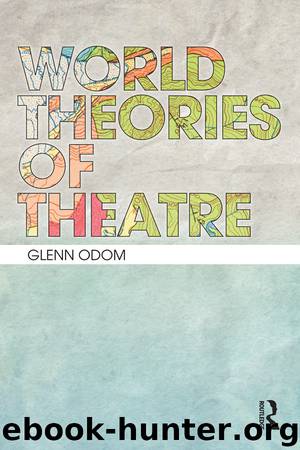World Theories of Theatre by Glenn Odom

Author:Glenn Odom
Language: eng
Format: epub
Publisher: Routledge
Global vs specific: universal vs particular
When dealing with theatre that specifically positions itself in terms of multiple cultures, the question of the universal comes up. On the one hand, claiming that all humanity shares certain characteristics can lead to ideas of equal treatment for people around the world. Things like slavery, genocide, religious wars, and the underlying racism, sexism, classicism, and xenophobia would be much more difficult to maintain if people firmly believed that there was more that united humanity than divided it. This is the idea of the universal in its positive form.
The same idea has a negative form as well, one that is inextricably bound to the positive aspects. Once people start trying to figure out what all humans share, it is a short step to the idea that all humans should share certain characteristics. The savage, the primitive, the uncivilized – these are labels for people who get left out of the universal. As Chinua Achebe vehemently points out, the word universal is generally synonymous with the word Western, and, as such, it almost always acts to the detriment of any non-Western culture. The idea of the universal is much less common in world theatre theory than it is in Western theatre theory.
The same liberal impulse that leads to the idealistic vision of the universal described above also leads to a celebration of distinct, individual cultures as having unique things to offer to the world. The idea of particularity, however, can slide into the same type of negativity as the idea of the universal. Valuing cultural difference can easily become a fetishizing of the exotic – a valuing of something simply because it is new and different without considering its place within its own culture. An insistence on difference can also lead to constructions of hierarchy – if two things are different, perhaps one is better, older, more cultured than the other. This leaves the intercultural practitioner in an awkward place, forced to negotiate between two ambivalent options.
Time plays a factor in the debate between universality and particularity. Werewere Liking and Derek Walcott talk about emergent cultural practices (whereas Maryrose Casey talks about emergent understanding of long-standing cultural practices). Part of Wole Soyinka’s argument about the universality of African theatre is rooted in its timelessness, in its connection to eternal matters. The idea of emergent cultures or cultural practices, given that it suggests change rather than timelessness, seems to be aligned with cultural particularity rather than cultural universalism. In other words, for something to be universal, it must be somewhat stable – otherwise it could not be shared around the world. Thus, these new practices described by Liking must, almost by definition, belong not to the universal but to the particular.
Rather than thinking about the universal and the particular as binaries, the theories in this chapter suggest that both these categories have something to offer. Considering where elements of a given piece of theatre fall on the scale of universality and particularity could be informative. Furthermore, figuring
Download
This site does not store any files on its server. We only index and link to content provided by other sites. Please contact the content providers to delete copyright contents if any and email us, we'll remove relevant links or contents immediately.
| Coloring Books for Grown-Ups | Humor |
| Movies | Performing Arts |
| Pop Culture | Puzzles & Games |
| Radio | Sheet Music & Scores |
| Television | Trivia & Fun Facts |
0805097341 (N) by Andrew Dickson(839)
The World Only Spins Forward by Isaac Butler(746)
Chaos Imagined by Martin Meisel(744)
Stella Adler on Ibsen, Strindberg, and Chekhov by Stella Adler(711)
The Crucible by Arthur Miller(533)
Philosophy and Theatre by Stern Tom(497)
Virgil Thomson by Virgil Thomson(487)
Real Life Drama by Wendy Smith(484)
Charles Dickens and the Great Theatre of the World by Simon Callow(469)
The Soviet Theater by Laurence Senelick(448)
The Columbia Anthology of Modern Chinese Drama by Xiaomei Chen(444)
Brecht in Practice by Barnett David(428)
Poetics of History by Lacoue-Labarthe Philippe;Fort Jeff;(417)
Shakespeare and the Countess by Chris Laoutaris(391)
The Videofag Book by Jordan Tannahill & Jordan Tannahill(387)
The Definitive Shakespeare Companion by Joseph Rosenblum(378)
Showtime at the Apollo by Ted Fox(370)
A History of Leadville Theater: Opera Houses, Variety Acts and Burlesque Shows by Scanlon Gretchen(344)
A Short History of English Renaissance Drama by Helen Hackett(336)
